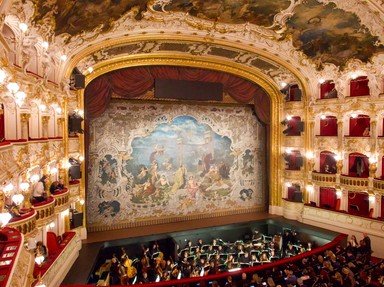Quiz Answer Key and Fun Facts
1. In early 18th Century Germany, there were a few popular kinds of theatre, including court theatres, Jesuit theatres, and English and German troupes of professional actors. Were the German troupes more popular than the English ones?
2. To support and revitalize German theatre, Gottsched and the Neubers formed an oft-imitated dramatist/actor collaboration. One of the members in this company was also a critic. Which one?
3. The trend in 18th Century theatre was Rationalism. Which German philosopher contributed to the basis of that movement?
4. Gotthold Lessing (1729-1781) was among the best dramatists of German Rationalism. One of his most famous plays, and one of the best philosophical dramas of the movement, was "Nathan the Wise" (1779). In the play is the story of three brothers who have inherited precious what?
5. The Storm and Stress (Sturm und Drang) movement was in reaction against Symbolism.
6. Early in his career, German theatre giant Goethe (1749-1832) wrote in the Storm and Stress movement. His novel from the period, "The Sorrows of Young Werther" (1774), was about a young intellectual trying to sort though the confusion of the world and his emotions. Eventually, Werther commits suicide. Was this a popular novel in its time?
7. Two premiere German dramatists of the 18th Century joined forces at the Weimar Theatre: Goethe and Schiller (1759-1805). Which theatrical style did they revitalize and draw upon?
8. Through his work at the Weimar Theatre, Goethe came to be known as a "director" in the modern sense. Which of these practices did the Theatre NOT follow?
9. Schiller began his career writing Storm and Stress plays. Later in his career, he became renowned for what kind of play?
10. Goethe was a grand literary figure in Germany and Europe in the 18th Century and the beginning of the 19th Century, but arguably his most important contribution was his version of "Faust", written in two parts: "Faust, Part One" (1808) and "Part Two" (1831). The story had previously been dramatized by Christopher Marlowe in "The Tragical History of Doctor Faustus" (c. 1590). What significant change did Goethe make to the story?
Source: Author
rj211
This quiz was reviewed by FunTrivia editor
agony before going online.
Any errors found in FunTrivia content are routinely corrected through our feedback system.

